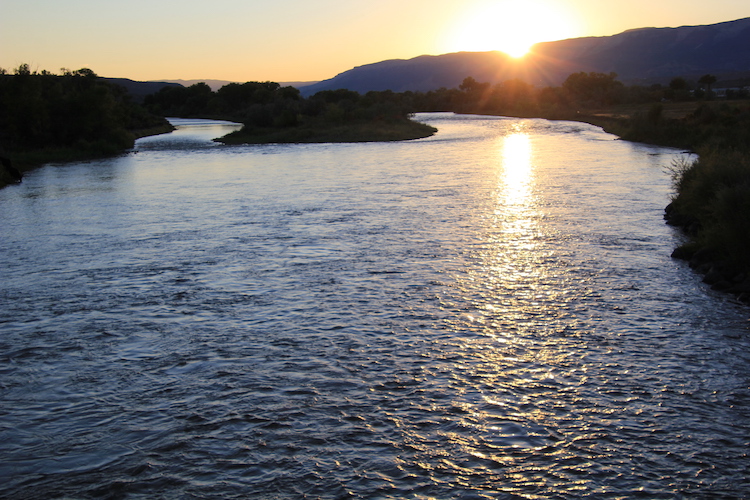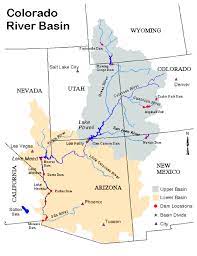
The sun setting on the Colorado River at Silt. Photo by Allen Best.
Water has been called “Our Most Precious Resource” Without it, all living things on earth die.
This means that the continuing negotiations between the Upper Basin states of the Colorado River Compact and the Lower Basin states are a matter of great importance to those of us whose lives and livelihoods, even if sometimes we don’t realize it — depend upon that river of life. They also depend upon the river for something else: electric power generation.
The current allocations among the seven states which constitute the Colorado River Compact are a century old, and out-of-date based on the present climate change realities of reduced snowpack and lower river levels. The states have failed over the past two years to come up with an equitable plan that all can agree upon, even though ordered to do so.
Late last year they got a reprieve and were given three more years to come up with an equitable solution, but now are ordered to make a place at the negotiating table for native tribes who also have water rights.
“The upper basin proposal is more rationally based and representative of reality,” said Commissioner Greg Felt during a Chaffee Board of County Commissioners (BoCC) session this week with representatives of our region’s U.S. Congressional offices. “I feel like this thing is going to devolve in the 2024 election year into appeasing the states that have the most votes – electoral college votes – and the Upper Basin comes up short in that measure.”
The Colorado River Compact Was created During a Time of Plenty

The Colorado River Basin. Image courtesy of Mission 2012: Clean Water
First, let’s be clear — the Upper Basin states of Colorado, Wyoming, Utah, and New Mexico are the source of the water. The Lower Basin states of Arizona, Nevada, and California use more of it than we do. Not much is left over for Mexico.
The current Colorado River Compact usage agreement dates back to 1922; an agreement created to regulate water distribution among seven states in the southwestern United States.
That compact, agreed upon by all the states that get water from the Colorado River, was negotiated at the high point of snowpack and water flows on the Colorado. It’s been downhill ever since. The four Upper Basin states have a legal requirement to deliver a minimum of seven million acre-feet of water to the Lower Basin.
While the Upper Basin has been meeting its requirements, the Lower Basin states have been using more than their allotment, dropping the water levels behind the two massive dams (Lake Mead and Lake Powell) that supply electrical power to more than 40 million people. The result – a water crisis and a looming energy crisis.
The west is 24 years into a historic drought — according to climatologists, the worst in 1,200 years. Lest readers in Chaffee County wonder what has this to do with us: the Fry-Ark agreement shares some of the water from the Colorado River Upper Basin over into the Arkansas River, impacting recreation and livelihoods in the Arkansas River Valley.
Felt has other official roles including serving as Chair of the Colorado Water Conservation Board, and the Board of the Southeastern Colorado Water Conservancy, as well as the Arkansas Valley Water Conservancy. He makes the point that the current usage is an over-allocation of the actual water in the river. Over the past year, three smaller Upper River Basin reservoirs in Colorado have been lowered to keep the dams at Lake Mead and Lake Powell operating.
In the BoCC meeting this week with representatives from Senator Michael Bennet, Senator John Hickenlooper, and Representative Brittany Pettersen’s offices, Felt encouraged federal officials to remain as involved as they have been on this issue.
“I feel like it really needs support from our entire delegation … we need pressure on the Bureau of Reclamation and the Dept. of Interior to look at this from a reality basis to make sure the solution is directed at where the problems have always been,” he explained. “The Bureau and the Interior Dept. has to have the courage to make the decision — it may go to litigation.”
Bennet serves as the Chair of the Senate Agriculture Subcommittee on Conservation, Climate, Forestry, and Natural Resources. This past year he added funding to this year’s Farm Bill to address the Western water crisis and make new investments in conservation, forests, and watersheds. The problem: the Republican-controlled House hasn’t yet funded the bill.
“I can’t imagine a worse situation than our current Supreme Court making these decisions,” added Felt. “We need you and them to – understand how strongly we feel about this in the Upper Basin. It affects all of us up here in the Upper Basin. But in the Lower Basin, it’s very few families — it’s corporations in the Imperial Valley and Yuma who are driving this.”
What he didn’t say was that big cities of the southwest — in Arizona, Las Vegas and California are filled with millions of residents, many watering bluegrass lawns in the middle of the desert.
For a collection of several Ark Valley Voice news stories regarding the water crisis in the Colorado River Basin follow this link.
Next week: A conversation with Commissioner Felt regarding progress on proposals to resolve the Colorado River Compact impasse.





Recent Comments